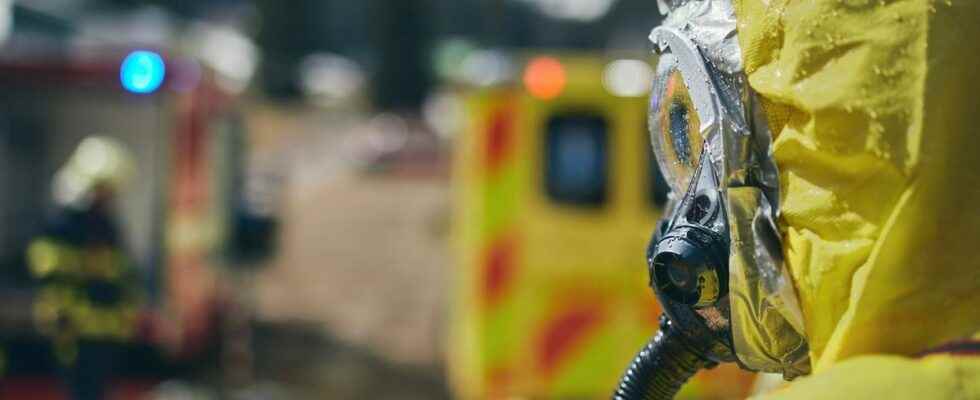Published on
Updated
Reading 4 mins.
According to the English press, a hospital center in the east of the country was urgently closed due to a suspected case of Ebola. The patient was returning from abroad and had several symptoms. The establishment, for its part, evokes a simple “control” without confirming or denying the cause, for the moment.
Stupor in England, on the side of the hospital center of Colchester, a city located on the east coast of the country. According to several media, the establishment was closed suddenly on Wednesday for a suspected fatal virus in a patient. According to information that is gradually filtering, the patient, who was returning from a trip abroad, presented symptoms revealing the Ebola virus. The following morning, the emergency center reopened normally while sporting a reassuring speech.
Verification tests are in progress
Following the event, the UK Health Safety Agency (UKHSA) simply stated in a statement:
“A section of a hospital has been temporarily closed due to a “possible” case of Ebola” evoking a “infection control problem”.
A spokeswoman for the East Suffolk and North Essex NHS Foundation Trust, which runs the hospital, elaborated on the reason for this “lockdown” a bit further: “Whenever people come to the emergency room or urgent care, one of the questions asked is ‘Have you traveled abroad recently?’ If they answer and say yes, depending on which country they’ve been to, we go through a very rigorous process that includes isolation. “This process involves ensuring the area is protected and all relevant steps including deep cleaning.”
Ebola is one of 11 viral hemorrhagic fevers known to date. The sick patient is being tested for a number of these viruses, with results expected in the next few days. A case that Dr Meera Chand, director of clinical and emerging infections at UKHSA, ultimately claims is trivial “People who have recently traveled and who report illness are regularly assessed by NHS clinicians for a variety of infectious diseases.”
At this time, the UKHSA says there are “currently no confirmed cases of Ebola in the UK”.
However, she refused to explicitly state whether the patient, who has not been identified, had just returned from Uganda, the only country in the world where the epidemic is currently active.
Can the Ebola epidemic affect Europe?
If confirmed, does this case represent a threat to Europe, when we know that Ebola is still an uncontrollable virus in Uganda. For Jean-Claude Manuguerra, head of the Biological Emergency Response Unit at the Institut Pasteur, the risks of spread to other countries, particularly in Europe, are relatively low:
“There may be cases exported out of Uganda, but this is still rare, for the simple reason that a person sick with Ebola will absolutely be in no condition to take a plane” he points out. “As for the people in incubation, from 2 to 21 days in the case of this virus, they are not contagious, so there are no fears for people who have traveled with them, they are not exposed.”.
In addition, Ebola epidemics are self-limiting: their start is zoonotic (coming from an animal) and always linked to an animal viral reservoir on site. As for transmission, it can be broken simply by isolating people during incubation, before they get sick.
“However, it was recently discovered that a person was still positive for Ebola several years after being cured, and that it could represent a start of transmission without going through the animal. It is therefore not impossible that the virus adapts and could change one day or another”.
Ebola: what happens if a case is detected in France?
In the event of suspicion of an exotic virus when returning from a foreign country, in particular from Africa, the specialist affirms, the French reaction is immediate: “I am a little surprised that doctors in England say they need several days to get a result, because the detection takes the form of a banal PCR test which generally gives a result in maximum 3 or 4 hours” he explains .
Faced with the possibility of an imported case, the machine quickly gets going: “The authorities demand answers immediately, because an Ebola patient for example, these are enormous constraints for the hospital, which mobilizes around 16 people for a single case. This is why at the slightest suspicion, we intervene 24 hours a day, even at night, to remove doubt as quickly as possible.”
As for the affected person, if detected in France, the specialist believes that symptomatic treatment (not against the virus, but to rebalance the ions in the blood and save the organs) given early enough, can help the body to pass beyond the critical moment and recover, in about 50% of cases.
Symptoms of Ebola include fever, fatigue, muscle aches, headache, sore throat, vomiting and diarrhea, rash, and in some cases bleeding gums or throat. blood in the stool, according to the World Health Organization (WHO). Uganda is currently the only country in the world with an active epidemic. Some 55 deaths have been recorded since it began in mid-September. Dozens more have been infected.
